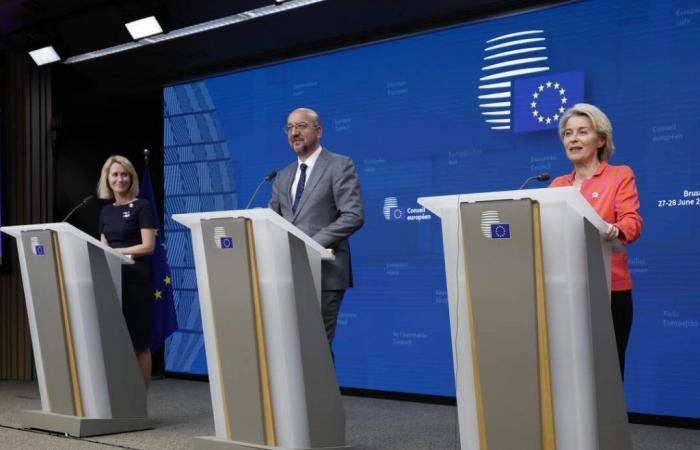
The “grand coalition” in action
These choices for the “top jobs” in Brussels will still have to be approved next month by Parliament. The names of the four had been circulating for weeks. On June 17, the 27 heads of state and government of the EU had already met in Brussels for an “informal dinner”, during which they discussed the distribution of these key positions and had already almost reached an agreement on the names. This Tuesday, six leaders, including Frenchman Emmanuel Macron and German Olaf Scholz, belonging to the “grand coalition” – EPP (right), S&D (social democrats) and Renew (center) – announced that they had found a agreement. This did not fail to provoke a reaction from the Hungarian and Italian prime ministers, Viktor Orban and Giorgia Meloni.
The latter, which is part of the group of European Conservatives and Reformists (CRE) – currently in 3rd position ahead of that of Emmanuel Macron (Renew) but with the Polish PiS which threatens to leave it – spoke of “oligarchy “. She was kept out of the discussions. The Hungarian leader, for his part, denounced a “shameful agreement” and a “coalition of lies with the left and the liberals”. “European voters have been misled,” he said. The European elections resulted in a progression of the far right which is weighing on the balance of power. And the French elections, the first round of which, which should confirm the success of the National Rally, takes place on Sunday, were on everyone’s lips.
It is in this tense context that the European summit is taking place, which ends this Friday, as Orban’s Hungary prepares to take over the rotating presidency of the EU. Giorgia Meloni, who emerged victorious from the elections, unlike Emmanuel Macron and Olaf Scholz, is pushing to obtain at least a vice-presidency of the Commission.
Here are the four nominees awaiting the green light from Parliament:
Kaja Kalla. The Estonian Prime Minister, 47, is expected to take on the role of high representative for EU foreign affairs and security policy. And replace the Spaniard Josep Borrell as head of diplomacy of the bloc. The “new Iron Lady of Europe” is part of the now fourth group in Parliament, Renew Europe, which lost 22 seats in the last elections. Kaja Kallas knows Brussels well having served there as an MEP. His father was also a European commissioner. From the start of the Russian invasion of Ukraine, it provided strong support to kyiv. She has always condemned Russia, Estonia’s direct neighbor, very firmly, demanding tougher sanctions against Moscow. Kaja Kallas is a lawyer by profession and has a son. She took the helm of the Reform Party, founded by her father, in 2018. And it was in 2021 that she became the first female head of government of Estonia. She was once considered to succeed Jens Stoltenberg at the head of NATO.
Also read: Kaja Kallas, Estonian Prime Minister: the “new Iron Lady of Europe” who refuses to be intimidated by Moscow
Antonio Costa. The former Portuguese prime minister, 62, who came to power in 2015, is expected to succeed Charles Michel. It is usually a former head of government who is appointed to head the European Council. The socialist with Indian roots was caught up in a scandal last November, targeted by an investigation for influence peddling and corruption. But legal blunders and the lifting of suspicions ended up clearing him. The affair clearly did not weigh on his appointment. His father was a writer, his mother a journalist. Father of two children, he trained as a lawyer and was Minister of Justice under Antonio Guterres, the current Secretary-General of the UN. He also knows Brussels, having briefly sat in the European Parliament. The socialist family, knowing that the post of President of the European Commission was reserved for the EPP, fought to obtain this key position.
The European Commission is currently working on a joint proposal by the European Commission to speed up the uptake of the EU’s digital transformation. The current president of the European Commission, 65, has detractors in her own political family: members of the French LR will vote against her when it comes to validating her appointment. She must take out her calculator for Parliament, having, in 2019, been elected by only nine votes. However, it must be endorsed by the absolute majority of 361 MEPs. To be chosen by the 27, only a qualified majority, i.e. at least 15 leaders out of 27, was required. However, 12 leaders are part of the EPP. On Thursday, she, unsurprisingly, suffered the wrath of Viktor Orban and Italian Prime Minister Giorgia Meloni. Ursula von der Leyen wrote a letter to the leaders of the 27 the day before the summit. She specifies that she will be ready to study proposals from 15 countries including Italy to outsource the processing of asylum applications to third countries. This is not the first time that she has pledged to her right. Ursula von der Leyen, mother of seven children, is a trained doctor.
Lire: Ursula von der Leyen, time for choices
Roberta Metsola. The Maltese, 45, will therefore remain in principle for two and a half more years as President of the European Parliament. But she did not have to count on the support of the Twenty-Seven. His re-election is solely in the hands of Parliament. In particular, she had to manage the “Qatargate” controversy, a vast corruption scandal which weakened the image of Parliament. Then espionage cases, which led to the search of offices within the body itself. Roberta Metsola is a lawyer by training and has four boys.





